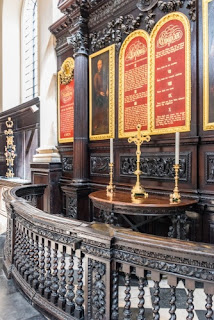"He hath left his mantle behind him": Thomas Comber on receiving the Sacrament on Holy Thursday
he first received the Holy Order of Priesthood, and the Power of Dispensing this Sacrament from your Grace's Hands.
He continues in thoroughly Laudian fashion when he expresses his hope that the work "may minister to the Devotion of those who approach to God's Altar".
The meditation on the Ascension Day proper preface, however, exemplifies how such Laudian reverence for the altar and the priestly ministry of administering the holy Sacrament - together with use of the Book of Common Prayer and observance of its festivals - was definitively Protestant. In fact, it is a rather glorious example of how a robustly Reformed Eucharistic understanding could sustain a warm sacramental piety.
As Comber says elsewhere in the work:
There needs no real change in the substance of the Elements, for this participation is not by sense but by Faith. This lively representation by the operation of the Spirit, gives us a fresh remembrance of the Love and Merit of our Redeemers Passion, so that by Faith we lay hold upon him, as the only satisfaction for our sins, and then the Power of God doth by these Symbols communicate our Lord unto us, and convey unto our Souls all the salutary benefits of that great expiation
It is because the Lord is ascended that there is no "personal presence" in this Sacrament: "he is here in his comforts and graces, here in his merits and his love". The consecrated Bread and Wine are "pledges and emblems". It is the heart and soul, not the mouth, which partakes of Christ in "this Holy Supper" - and we should note that the work is subtitled 'An help to the worthy receiving of the Lords Supper'.
And so on this Holy Thursday, "Thou standest like Elisha, looking after him and lamenting thy Master's departure, but he hath left his Mantle behind him, even the mysteries of this holy Sacrament" - means by which we are united to our Ascended Head:
And now O my soul, why standest thou gazing into Heaven, he is too high to be discerned, too bright to be seen with mortal Eyes, since Cherubins are dazzled at his splendor. He is gone to his proper place, and ascended thither, whither thy desires carry thee, and where ere long thou shalt see him face to face: Thou standest like Elisha, looking after him and lamenting thy Master's departure, but he hath left his Mantle behind him, even the mysteries of this holy Sacrament, which to thy Faith is the flesh which he was clothed with all, and is designed to convey a double portion of his spirit unto thee; so that it appears he hath left his Love with us when his Person was taken from us.
Away then with these sighs and tears, lament no longer the absence of thy Lord, for he is in this Blessed Feast; he is here in his comforts and graces, here in his merits and his love, and his spirit can Minister the same benefits hereby, which his personal presence would have given thee; Go then with all possible speed and taste of this Heavenly Provision, delight in it above all the sweetnesses in the World, because it contains so many pledges and emblems of thy glorious Redeemer's love.
When thou beholdest him that is thy head so advanced, make haste to unite thy self nearer to him by partaking of his Body and Blood, that thou mayest finally reign with him; in the mean time raise up thy thoughts above this lower World, declare thy desire to be with Jesus, send thy heart before, and protest if he had not left thee some little tastes of his sweetness, in the repast of this holy Table by the way, thou couldst not have endured so long without him: There is nothing which he loves comparable with his Throne in Heaven, unless it be an humble and thankful heart, into which I am about to receive him, and as the Coelestial Quire welcomed him thither, so will I receive him with joy into my poor Soul. Therefore with Angels, &c.




Comments
Post a Comment